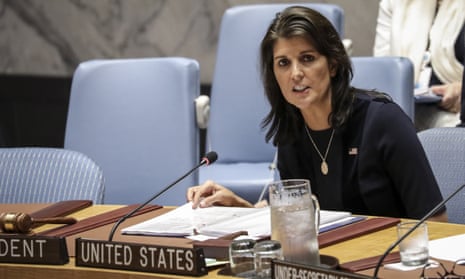The US has accused Russia of wholesale violations of international sanctions on North Korea, secretly transferring huge quantities of oil and other commodities to the regime’s ships at sea.
In a heated session of the UN security council, the US envoy, Nikki Haley, said Moscow had systematically sought to evade sanctions on Pyongyang and then cover up its operations by suppressing an official UN report.
Her Russian counterpart, Vassily Nebenzia, rejected the accusation and said his office had not tried to censor the report by a UN panel of experts, but had merely wanted Russian views to be reflected.
But Haley said Washington had “evidence of consistent and wide-ranging Russian violations”.
“To evade port inspections, oil tankers come together over the high seas. North Koreans use hoses to transfer refined petroleum products to their ships to bring back home. Many tankers are willing to provide oil to make a quick buck,” the US ambassador added.
She said that the US tracked “at least 148” cases of oil tankers delivering petroleum products in illegal ship-to-ship transfers, but did not make clear how many of these cases involved Russian ships. Haley said that the North Korean regime had obtained between 800,000 and 2m barrels of refined petroleum in the first eight months of the year – well above the 500,000 barrels cap set by the UN.
She listed other ways in which she said Russia had sought to blunt UN scrutiny and sanctions on North Korea for its nuclear weapons and missile programme.
“Step by step, sanction by sanction, and time and time again, Russia is working across the board to undermine the sanctions regime,” Haley said, adding that last month’s UN panel of experts report “contained evidence of multiple Russian sanctions violations”.
“We have seen and read this report,” the US envoy said. “But when the panel submitted the report to the security council last week, we noticed something deeply troubling. The evidence of Russian violations that was detailed in the earlier report was missing. It had been removed from the open section of the report.”
“Apparently, Russia threatened to prevent release of the report unless its demands to hide the evidence of its violations was met. To our deep regret, the panel agreed,” Haley said.
A European diplomat at the UN confirmed that a section on Russian sanction-busting had been removed from the expert panel report.
“We heard they were making changes and then last week, they made a quite different report,” the diplomat said.
The UK ambassador to the UN, Karen Pierce, said the panel’s report should be “submitted in its original form”, calling it “extensive and well-researched”.
The UN did not respond to questions about the changes made by the panel of experts. In his reply to Haley, Nebenzia said that member states were entitled to communication with the experts panel to present evidence and counter-arguments. The report had not been redacted, he argued, but a particular passage on a Russian company had been removed only from the published version of the report.
“The panel of experts ... has become extremely politicised for reasons beyond our control, it has been almost taken hostage by Washington, which is trying to prevent the normalization of inter-Korean relations with all its might,” Nebenzia said. “Sanctions cannot replace diplomacy,” he said.
The security council row over sanctions-busting came at a time when the leaders of North and South Korea are preparing for a third summit next week in Pyongyang, in a bid to revive momentum towards defusing tensions and paving the way towards disarmament.
Following his own summit with Kim Jong-un in June, Donald Trump had declared North Korea was “no longer a nuclear threat”. However, the UN under secretary-general Rosemary DiCarlo told the security council that “there continue to be signs the DPRK is maintaining and developing its nuclear weapons and ballistic missile program”.
The nuclear watchdog, the International Atomic Energy Agency, also said last month that it had “grave concern” over the further development of Pyongyang’s weapons programme.
Haley insisted however, that the Trump-Kim summit had “set us on a path toward complete denuclearization”. But she added: “But we’re not there yet. And until we get there, we must not ease the powerful worldwide sanctions that are in place.”
